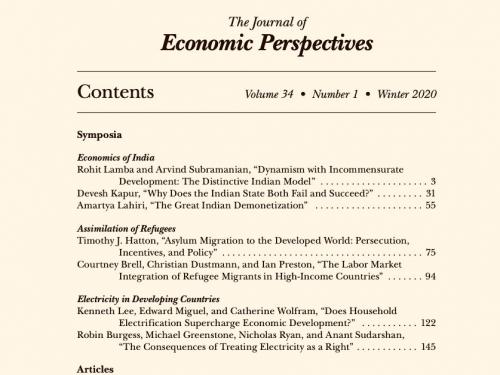EGC and development research, past and future
 Lloyd Reynolds, the founding director of Economic Growth Center wrote in 1968, “Economic development is an activity in search of intellectual framework.” Since then, much has changed. I began as the Center Director in July 2019, and in the autumn, I spoke in an interview about the EGC’s past and its future. Since its founding in 1961, EGC has supported research that applied rigorous quantitative methods to understand poverty and growth and, in doing so, sought to develop an intellectual agenda for development economics. In my interview, I talked about how EGC researchers were both continuing its quantitative tradition, while adapting to answer new questions about the nature of inequality in a world where the spoils of growth often benefit the rich. Attanasio and Meghir, for instance, evaluate the role of early childhood interventions in breaking the intergenerational transmission of poverty. In a recent review in the Journal of Economic Literature, Munshi examines the continuing role of caste in determining access to opportunity in India.
Lloyd Reynolds, the founding director of Economic Growth Center wrote in 1968, “Economic development is an activity in search of intellectual framework.” Since then, much has changed. I began as the Center Director in July 2019, and in the autumn, I spoke in an interview about the EGC’s past and its future. Since its founding in 1961, EGC has supported research that applied rigorous quantitative methods to understand poverty and growth and, in doing so, sought to develop an intellectual agenda for development economics. In my interview, I talked about how EGC researchers were both continuing its quantitative tradition, while adapting to answer new questions about the nature of inequality in a world where the spoils of growth often benefit the rich. Attanasio and Meghir, for instance, evaluate the role of early childhood interventions in breaking the intergenerational transmission of poverty. In a recent review in the Journal of Economic Literature, Munshi examines the continuing role of caste in determining access to opportunity in India.
With the onset of Covid, these questions have become even more urgent. Early evidence suggests that, unless policy intervenes, the faultlines of an unequal global economy will only deepen. I am witnessing firsthand how our researchers are adapting again, now at breakneck speed, to contribute rigorous analysis to some of the most consequential policy questions in developing countries that we will see in our lifetimes: how to address this global crisis in a way that is appropriate to contexts of limited resources – and at the same time protect the world’s most vulnerable people. And, by accumulating research evidence, the researchers are also helping develop intellectual frameworks for understanding impacts. To cite just a few examples - Mobarak is providing important evidence on the economic costs of lockdowns in lower income countries and Donovan is evaluating the role of mobile cash in helping Kenyan slum dwellers deal with the lockdown shock. Goldberg, in her writing, has identified some of the likely impacts for global supply chains. Throughout, an important focus of this and other ongoing EGC work is on the longer run impacts of economic forces for developing countries and the lives of their citizens, whether those forces are cross-border trade, or pandemics, or climate change. Rosenzweig and Ryan both have new papers on environmental policy in developing countries.
EGC also redesigned our summer internship program and hired students from Yale College and our International and Development Economics masters program, many of whom had watched their summer internships and travel plans vanish. Now they are crunching data and writing briefs about Covid-related research from their homes around the world, helping us provide insights to policymakers who are meeting the crisis head-on. They are also helping us create longer term data archives.
I invite you to keep checking EGC’s new website over the summer to see the fruits of their labor. And watch for announcements about programming surrounding EGC’s 60th anniversary during the 20/21 academic year, as we celebrate 60 years of building frameworks to understand and guide international development.

Rohini Pande
Henry J. Heinz II Professor of Economics
Director, Economic Growth Center
To receive our quarterly newsletter in you inbox, join our mailing list.
EGC economists are seeking to answer critical policy questions raised by the pandemic.
How is Covid-19 affecting the poor, particularly women and children?
- Orazio Attanasio, Costas Meghir and Fabrizio Zilibotti are exploring impacts for children.
- Rohini Pande and Charity Troyer Moore of Yale MacMillan Center are surveying poor women and migrant workers in India.
How do the spread of the virus and the appropriate responses differ country by country?
- Mushfiq Mobarak and colleagues at Y-RISE are building models to predict the virus’s spread, and giving insights on how to tailor a response.


